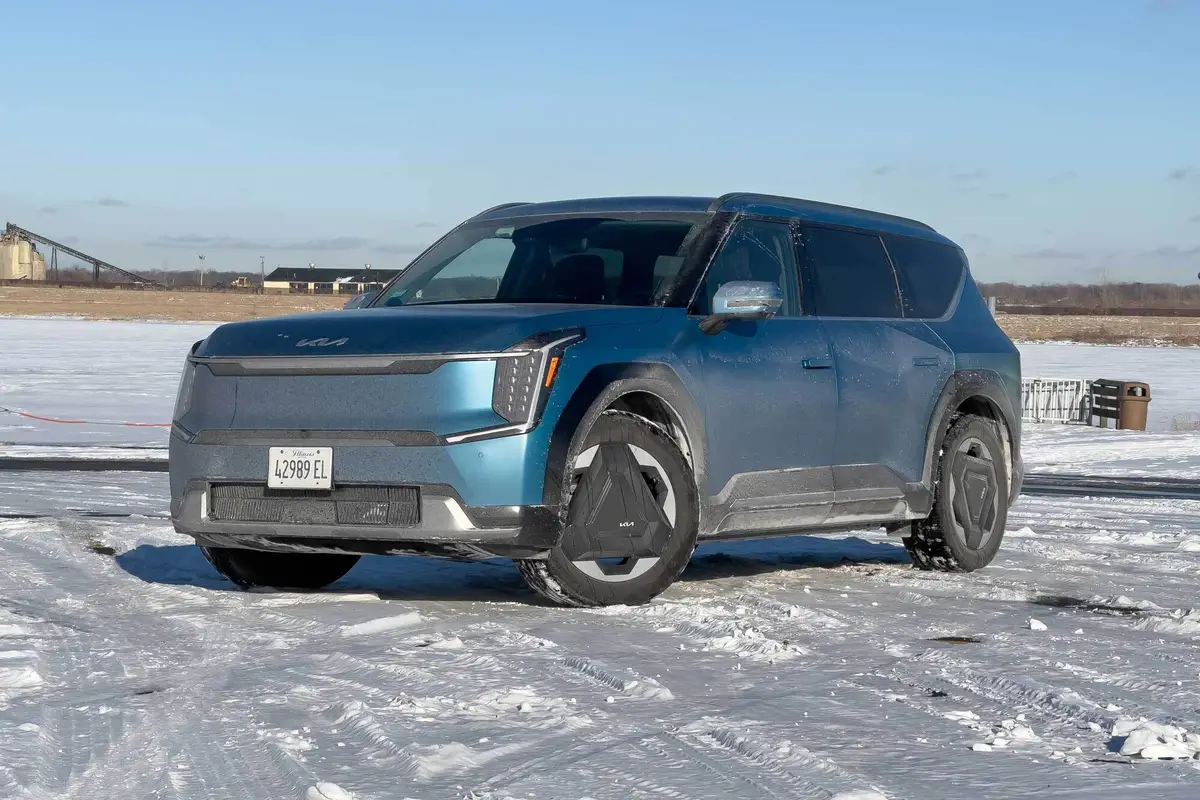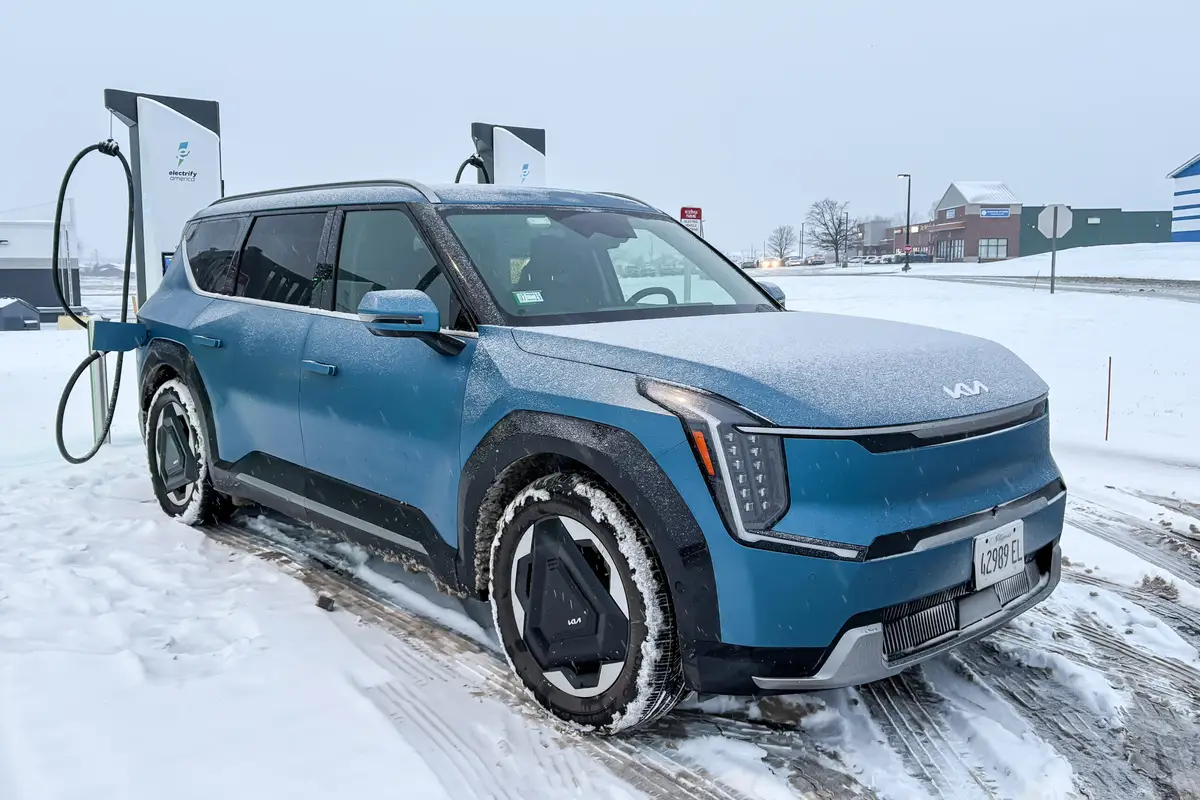How Well Does the Kia EV9 Drive in the Snow?


As the first mainstream-brand, relatively affordable all-electric SUV with a decently spacious third row, the Kia EV9 is arguably the first viable electric alternative to gas-powered family SUVs like the Honda Pilot, Hyundai Palisade, Volkswagen Atlas and Kia’s own Telluride. As such, Cars.com’s primary focus in testing our long-term 2024 EV9 is evaluating how it stacks up to those traditional three-row competitors in all manner of family hauling duties — including how it drives on the slippery, sometimes treacherous roads that are part and parcel of a typical Midwestern winter.
Related: How Well Does the Kia EV9 Work for a Cold-Weather Road Trip?
Though the winter of 2024-25 turned out to be one of the least snowy on record for our Chicagoland environs, we still had enough of the white stuff to test how the EV9 handles snowy, slushy and icy surfaces. Senior Road Test Editor Mike Hanley took our EV9 on a January road trip from Chicago to Detroit, and Managing Editor Joe Bruzek conducted traction tests on an ice and snow-covered boat ramp incline near his suburban Chicago home. The two editors arrived at similar conclusions.
One-Pedal Mode Is a No-No in Snow
Most EVs have a regenerative-braking system that uses the electric motor to slow the vehicle when the driver lifts their foot off the accelerator pedal, and many EVs let the driver set how strong the regenerative braking is. The EV9’s regen settings include an i-Pedal one-pedal driving feature that lets the driver bring the vehicle to a stop without pressing the brake pedal at all.
Regenerative-braking systems have several benefits, but the feature can cause stability issues when roads are slippery. Hanley said, “While I like to use the EV9’s i-Pedal one-pedal driving feature in most driving situations, it’s not good for snowy roads; strong, immediate regenerative braking when lifting off the accelerator pedal unsettles the EV9. I had to reduce the aggressiveness of the regenerative-braking system to Level 1, where it offers mild braking when you lift off the accelerator, and even to Off, where the system lets you coast. Reducing the forcefulness of the regen braking or turning it off completely made the SUV easier to drive.”
Bruzek experienced some issues with the EV9’s braking on slippery surfaces — particularly with the regenerative braking set at a higher level — though he noted that the vehicle’s traction during acceleration was fine: “Acceleration in the snow isn’t a problem for the EV9 with its all-wheel drive and hefty curb weight. I never felt like I was at a loss for forward traction, even while performing traction tests on an ice- and snow-covered boat-ramp incline. However, I wanted more traction while braking, which didn’t feel super-confident on slippery roads, and it was especially sketchy before the tires got any heat in them from normal driving.”
“This was exacerbated by being in a regenerative-braking mode that was too aggressive while letting off the accelerator to turn, which applied too much brake to the rear wheels that overwhelmed the tires and kicked out the rear end a bit before the stability control stopped the slide. I wasn’t in danger of spinning out, but it definitely was enough of a change of course to catch my attention. I highly recommend turning the regenerative braking down to Level 1 or zero on slippery roads, especially when first leaving the neighborhood.”
Selecting the EV9’s Snow driving mode is also recommended; it optimizes the vehicle’s responses and other parameters for traction and stability on slippery roads, and it caps the regenerative-braking system to Level 1.

Winter Tires or Upgraded All-Season Tires Are Recommended
Both Bruzek and Hanley were underwhelmed with the snow performance of the factory-installed Kumho-brand tires on our EV9. Hanley noted, “The EV9 has P275/50R20 Kumho Crugen EV tires that are mud- and snow-rated, but I could feel the SUV sliding a bit on slush-covered roads. I’d prefer the confidence that comes with a set of dedicated winter tires if I was going to be regularly driving the EV9 on snow- and ice-covered roads.”
Bruzek concurred: “Luckily, my area has very good snow removal and proactive road care when ice and snow is in the forecast, but for those who don’t, I’d recommend looking at either a dedicated set of winter/snow tires, or an all-season tire with better snow performance than the standard Kumho Crugen EV HP71 tires that come from the factory. These Kumhos seem to be lacking in snow braking traction.”
More From Cars.com:
- 2025 Volkswagen ID. Buzz Vs. 2024 Kia EV9: Which Is the Better Family EV?
- 2025 Volkswagen ID. Buzz Vs. 2024 Kia EV9: Cold-Weather Efficiency Test
- Long-Term Kia EV9 Update: What We’ve Learned After 10,000 Miles
- How Fast Does the 2024 Kia EV9 Charge?
- Shop for a New Kia EV9 Near You
Another Winter Issue
During his road trip, Hanley also experienced an issue that can apply to any modern vehicle. “Snow and winter highway road spray can lead to various blocked exterior sensors and prevent some vehicle systems from working as expected. During the course of one highway drive in wintry conditions, I received numerous warnings in the EV9’s instrument panel about blocked sensors, and when I looked at the front of the SUV at the end of the drive, it was covered in a layer of road grime.”
In general, however, the EV9 gets a passing grade for its winter-weather tractability. Hanley summed it up thusly: “Overall, the Kia EV9 drives reasonably well in the snow — no worse or better than any other three-row SUV with all-season tires.”
Related Video:
Cars.com’s Editorial department is your source for automotive news and reviews. In line with Cars.com’s long-standing ethics policy, editors and reviewers don’t accept gifts or free trips from automakers. The Editorial department is independent of Cars.com’s advertising, sales and sponsored content departments.

Senior Research Editor Damon Bell has more than 25 years of experience in the automotive industry, beginning as an Engineering Graphics researcher/proofreader at model-car manufacturer Revell-Monogram. From there, he moved on to various roles at Collectible Automobile magazine and Consumer Guide Automotive before joining Cars.com in August 2022. He served as president of the Midwest Automotive Media Association in 2019 and 2020.
Featured stories




